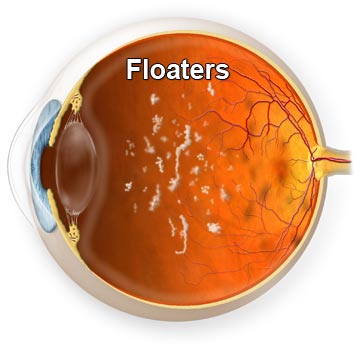iVideo Blogs Update:
I apologize that I haven’t been able to go full force on the video blogs yet. I’m still learning how to edit videos and make the presentation of the video better before moving forward. Meanwhile, I’ll post regular blogs to keep you guys occupied!
FLOATERS!
A good friend of mine texted me yesterday asking me about his mom seeing floaters and what information I could give him in dealing with floaters. She got it checked out by her optometrist and thankfully it wasn’t anything that required surgery or further intervention. Floaters can be alarming and traumatizing to some people if they are larger in size and become an annoyance.
Eye floaters are tiny spots, strings or cobwebs in the eye that drift around in your field of vision. They can be annoying or you may not notice them at all. These are actually very common and there usually aren’t any cause for alarm.
Floaters are proteins of the eye’s gel-like vitreous that will break loose from their attachments. As we age, the vitreous begins to dissolve and liquefy to create more of a watery center. Some of the dissolved particles will float around in the liquid becoming what we call a “Floater”.
More information on floaters below courtesy of www.allaboutvision.com
When Are Eye Floaters and Flashes a Medical Emergency?
If you see a shower of floaters and spots, sometimes accompanied by light flashes, you should seek medical attention immediately.
The sudden appearance of these symptoms could mean that the vitreous is pulling away from your retina or that the retina itself is becoming dislodged from the inner back of the eye that contains blood, nutrients and oxygen vital to healthy function. When the retina is torn, vitreous can invade the opening and push out the retina — leading to a detachment.
A study reported in the Journal of the American Medical Association in late 2009 found that sudden presence of eye floaters and flashes means that one in seven people with these symptoms will have a retinal tear or detachment. And up to 50 percent of people with a retinal tear will have a subsequent detachment.
In cases of retinal tear or detachment, action must be taken as soon as possible so that an eye surgeon can reattach the retina and restore function before vision is lost permanently.
Posterior vitreous detachments (PVDs) are far more common than retinal detachments and often are not an emergency even when floaters appear suddenly. But some vitreous detachments also can damage the retina by tugging on it, leading to a tear or detachment.
Light flashes known as photopsia can occur when your retina receives non-visual (mechanical) stimulation, which can happen when it is being tugged, torn or detached.

